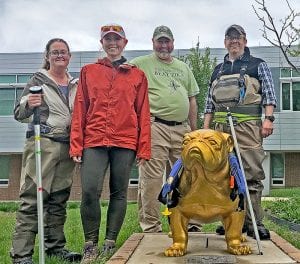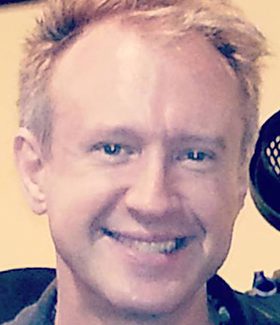First Student Successfully Defends Her Dissertation in WIU’s Environmental Science Doctoral Program
MACOMB/Moline, IL – The first student candidate for graduation from Western Illinois University’s Environmental Science: Large River Ecosystems Ph.D. program has successfully defended her dissertation.
Michele Rehbein, of Helper, UT, received her bachelor’s and master’s degrees in biology from WIU, in 2013 and 2016 respectively. She defended her dissertation, “Mosquitoes of Wetland and Low Order Streams in West-Central and North Central Illinois: Developing Models Between Culex Mosquito Abundance Versus Abiotic Factors and Identification of Mosquito Hosts through Genetic Sequencing.” She will now become the doctoral program’s first graduate.
The program, based on WIU’s Quad Cities campus and started in Fall 2014, is directed by Professor Roger Viadero, chair of the Environmental Science Ph.D. program and director of WIU’s Institute for Environmental Studies.

Pictured, from left, are Ph.D. candidates Vickie Livingston, Michele Rehbein and Jason Hunt, with Roger Viadero.
“Being a part of the Environmental Science Ph.D. program was of course challenging, but a fun experience,” said Rehbein. “Not only was I able to work alongside other amazing students and faculty in our lab, but was provided opportunities to present my research at conferences, meet other professionals, and the best part: explore new research projects outside in the field.”
Rehbein said she considers herself fortunate to work with and learn from Viadero throughout her academic program.
“Being in a Ph.D. program is truly an individual journey, and this program taught me the confidence needed to conduct my work independently and further grow as a scientist,” she said. “I am excited to start the next chapter of my life and career and plan to stay connected with everyone at the Institute for Environmental Studies.”
Viadero said Rehbein’s studies are an expansion on her earlier work on West Nile Virus (WNV) surveillance in west-central Illinois.
“Rivers are known to be pathways for the transmission of a number of mosquito-borne viruses that are especially significant to human health,” said Viadero. “Michele’s efforts included the modeling of mosquito abundance as a function of key abiotic factors (temperature, time, precipitation, etc.) in small rural streams that feed large river systems. While conducting her field research, Michele also made the first observance of two invasive mosquitoes in north-central Illinois.”
Rehbein is one of six doctoral candidates in the doctoral program. The multidisciplinary effort engages student-scientists from a variety of physical, life, and/or mathematical science disciplines in studies that advance the state of knowledge on topics of environmental significance in large river systems.
For more information about the program, visit wiu.edu/ies.









